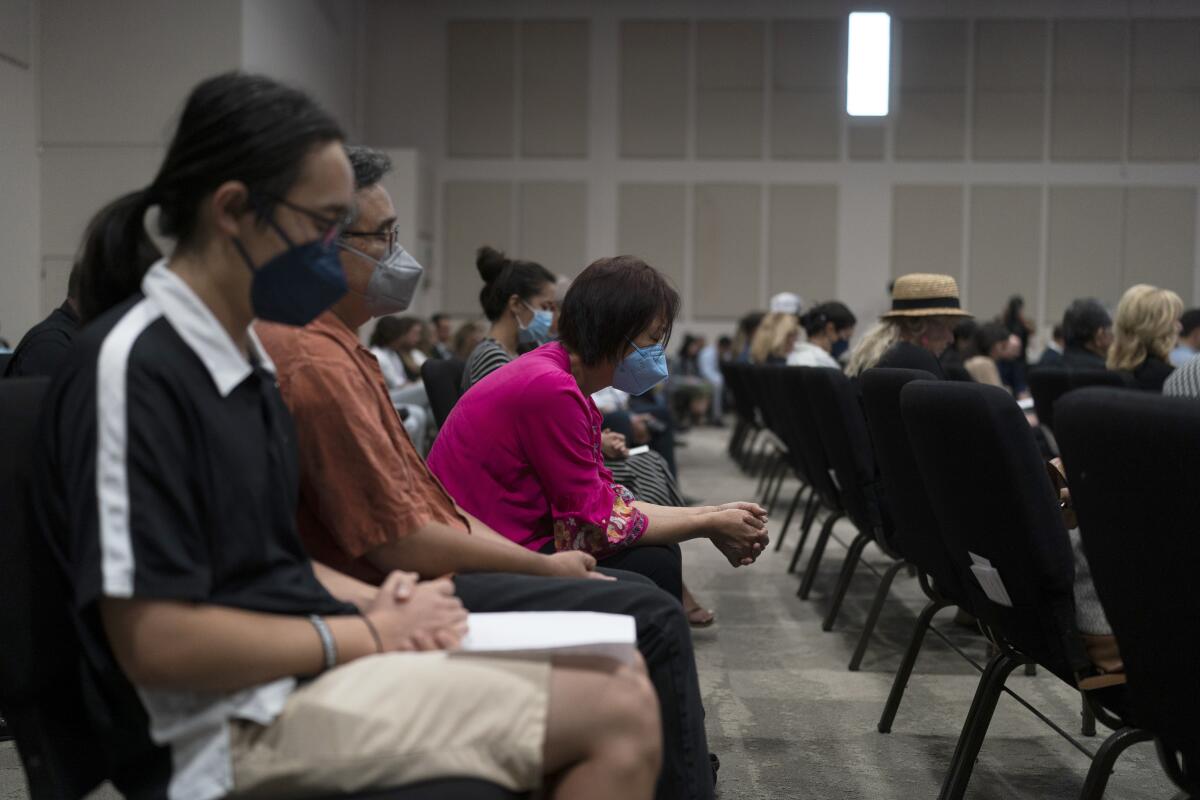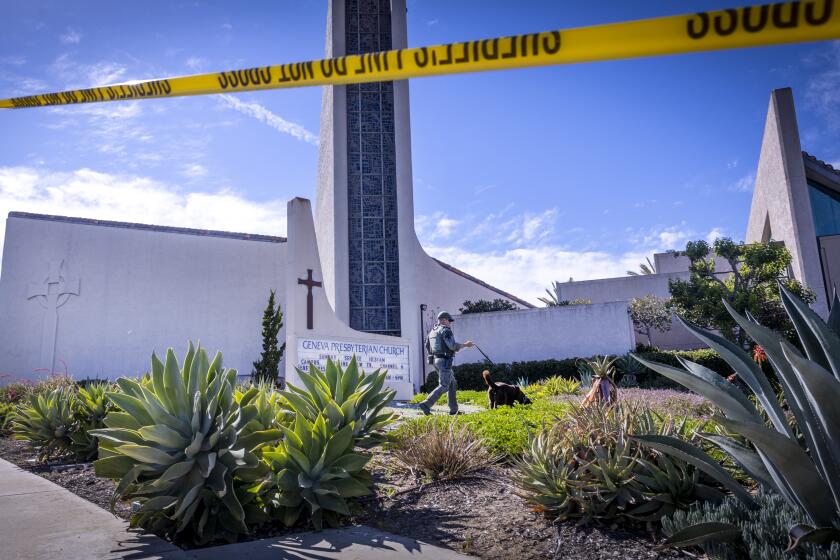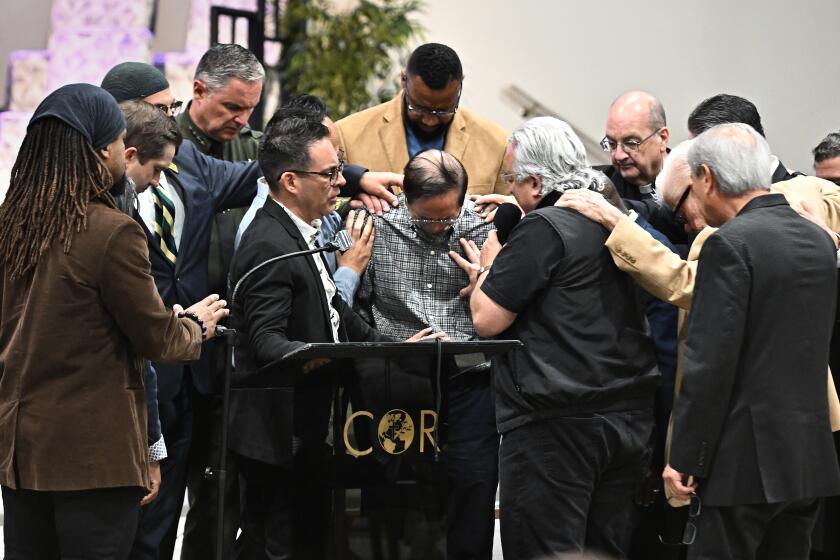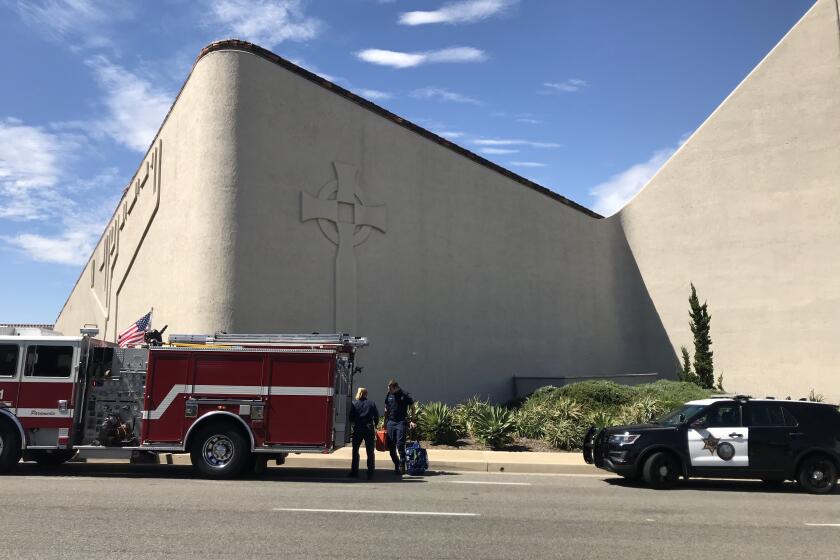Taiwan’s president condemns Laguna Woods church shooting

- Share via
TAIPEI, Taiwan — Taiwan’s president has condemned the shooting at a Laguna Woods church by a gunman who authorities said was driven by hatred of the island, while a lawmaker from her ruling party questioned whether Chinese propaganda was a motivating factor behind the violence.
President Tsai Ing-wen’s office issued a statement Tuesday saying she condemned “any form of violence,” extended her condolences to those killed and injured and had asked the island’s chief representative in the U.S. to fly to California to provide assistance. Many of the congregants at the Irvine Taiwanese Presbyterian Church, which rents space at Geneva Presbyterian Church in Laguna Woods, are elderly immigrants from Taiwan.
The alleged gunman, 68-year-old David Wenwei Chou of Las Vegas, is expected to appear in court Tuesday. He was booked on suspicion of murder and attempted murder Monday and is being held in lieu of $1-million bail at the Orange County Intake Release Center.
One man was killed and five people were wounded in the shooting, which occurred Sunday afternoon. A federal hate crimes investigation has been opened by the FBI.
Chou, a U.S. citizen, apparently had a grievance with the Taiwanese community, police said. Chou was born in Taiwan in 1953, Taiwan’s Central News Agency reported, citing the head of the Taipei Economic and Cultural Office in Los Angeles, Taiwan’s de facto consulate in the city.
According to Taiwanese media, Chou had ties to a mainland Chinese-backed organization opposed to Taiwan’s independence, although details could not immediately be confirmed.
A gunman attacked a lunch banquet at Geneva Presbyterian Church in Laguna Woods on Sunday, killing one person and wounding five. Here’s what we know.
China claims Taiwan as its own territory, to be annexed by force if necessary, and regularly denounces Tsai, her ruling Democratic Progressive Party, or DPP, and their foreign supporters in increasingly violent terms.
Tensions between China and Taiwan are at the highest in decades, with Beijing stepping up its military harassment by flying fighter jets toward the self-governing island.
In Taiwan, DPP legislator Lin Ching-yi said that “ideology has become a reason for genocide” in a message on her Facebook page.
Lin said Taiwanese people needed to “face up to hateful speech and organizations” backed by China’s ruling Communist Party, singling out the United Front Work Department, which seeks to advance China’s political agenda in Taiwan and among overseas Chinese communities.
When the suspect began shooting, Dr. John Cheng put himself in the line of fire and tried to prevent others from being shot, sheriff’s officials say.
The U.S. is Taiwan’s chief political and military ally, but it does not have formal diplomatic ties with the island, in deference to Beijing.
Bi-khim Hsiao, Taiwan’s de facto ambassador to the U.S., tweeted Monday that she was “shocked and saddened by the fatal shooting at the Irvine Taiwanese Presbyterian Church in California.”
“I join the families of the victims and Taiwanese American communities in grief and pray for the speedy recovery of the wounded survivors,” Hsiao wrote.
Chou’s hatred toward the island, documented in handwritten notes that authorities found, appears to have begun when he felt he wasn’t treated well while living there.
Authorities said the actions of churchgoers likely saved lives.
A former neighbor said that Chou’s life unraveled after his wife left him and that his mental health had been in decline.
Chou’s family appeared to be among the roughly 1 million refugees from mainland China who moved to Taiwan at around the time of the Communist sweep to power on the mainland in 1949.
Taiwan had been a Japanese colony for half a century when Tokyo, defeated in World War II, handed the island over to China, then under Nationalist Party rule, in 1945.
Relations between mainland Chinese and native Taiwanese were often tense. Separated by language and lifestyle, incidents of bullying and confrontation between the two sides were frequent.
Breaking News
Get breaking news, investigations, analysis and more signature journalism from the Los Angeles Times in your inbox.
You may occasionally receive promotional content from the Los Angeles Times.
Many youth from the mainland, who were concentrated in Taiwan’s major cities, joined violent organized-crime gangs with ties to the military and Chinese secret societies, in part to defend themselves against Taiwanese rivals.
The Presbyterian Church is the most prominent of the Christian dominations in Taiwan and was closely identified with the pro-democracy movement during the island’s decades under martial law and later with the campaign for Taiwanese independence.
More to Read
Sign up for Essential California
The most important California stories and recommendations in your inbox every morning.
You may occasionally receive promotional content from the Los Angeles Times.












